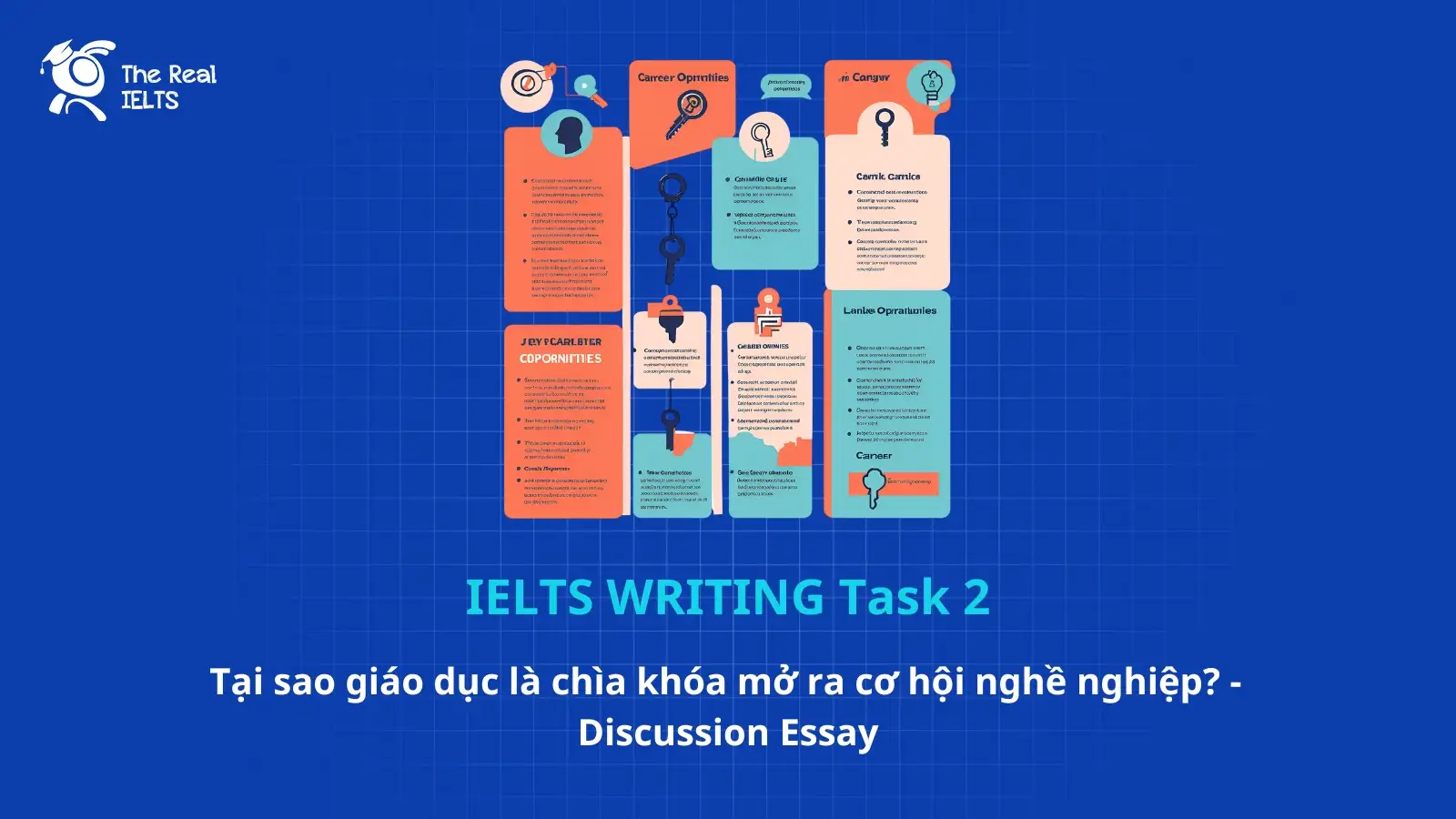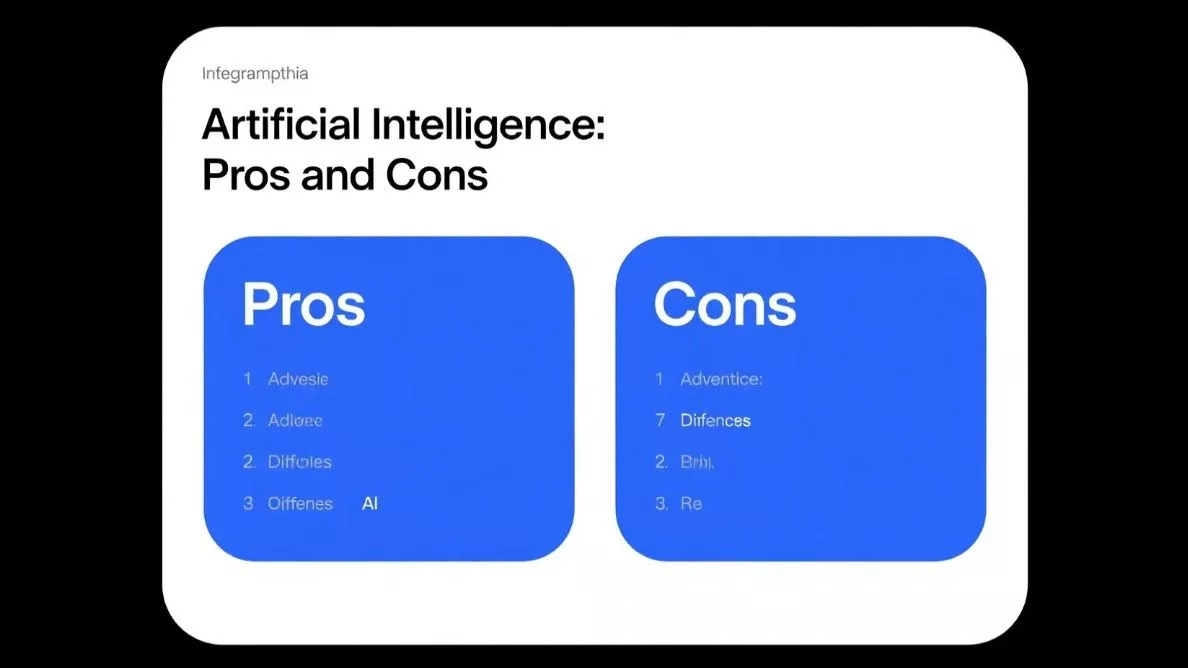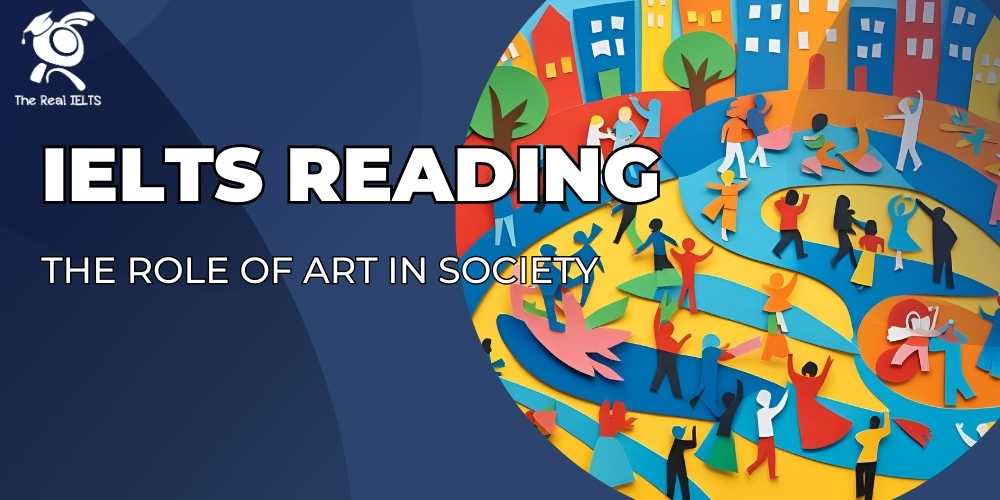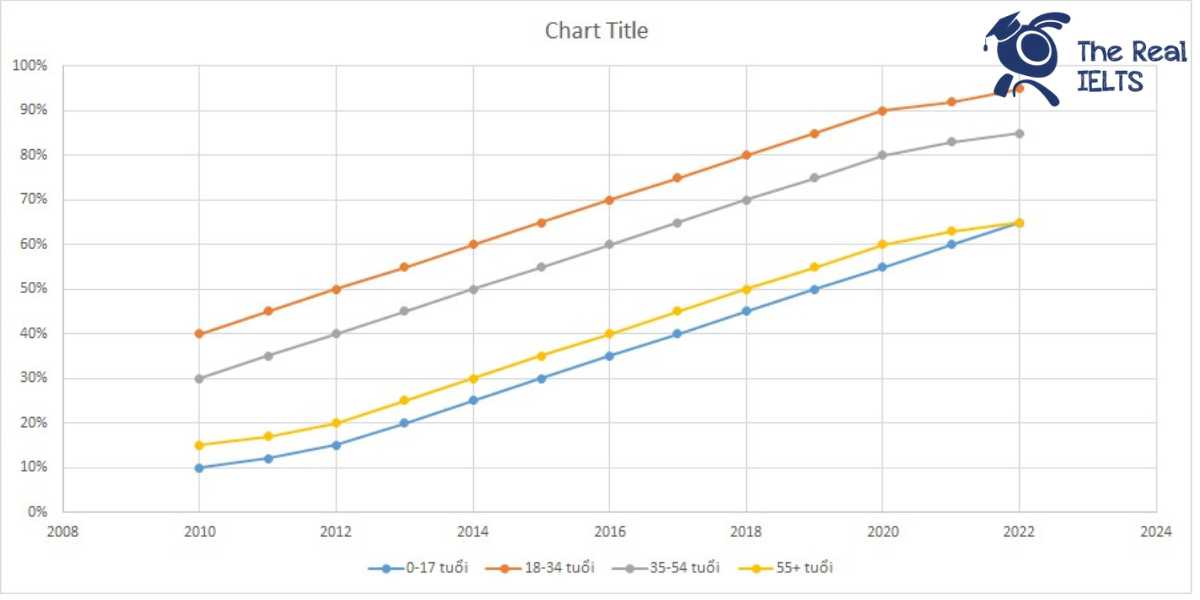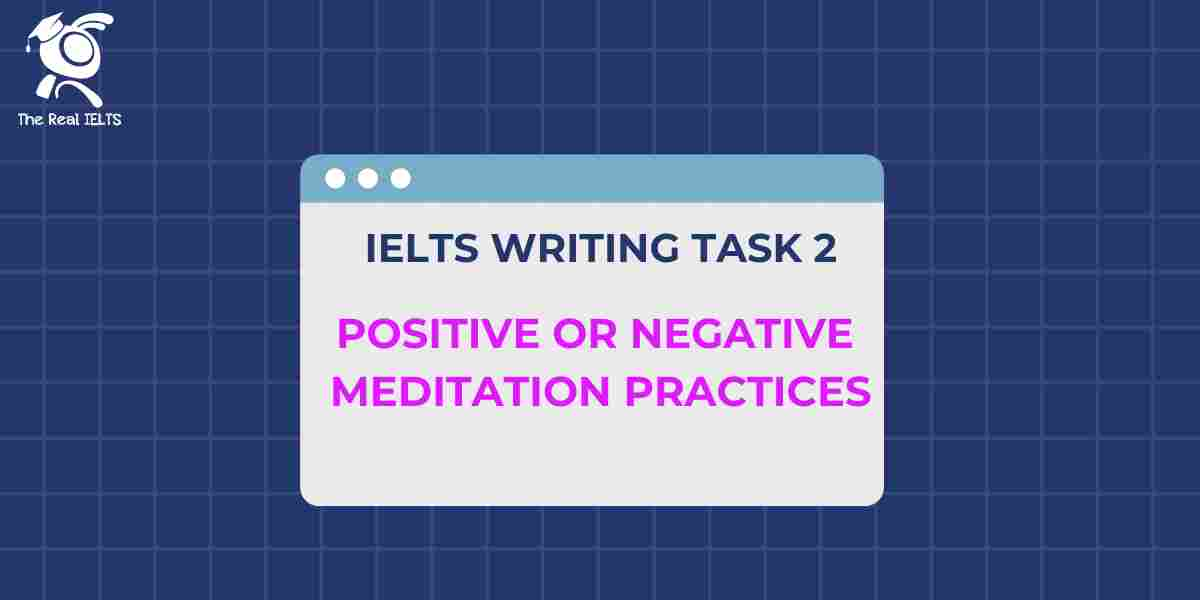Trong IELTS Writing Task 2, dạng Discussion Essay yêu cầu thí sinh phân tích nhiều góc nhìn về một vấn đề. Một số người tin rằng giáo dục là chìa khóa mở ra cơ hội nghề nghiệp, trong khi người khác cho rằng kinh nghiệm thực tế quan trọng hơn. Vậy đâu là yếu tố quyết định?
Đọc thêm: IELTS Writing Task 2: Tại sao giáo dục là chìa khóa mở ra cơ hội nghề nghiệp? – Agree or Disagree
Đề bài IELTS Writing Task 2: Tại sao giáo dục là chìa khóa mở ra cơ hội nghề nghiệp? – Discussion Essay
Some people believe that education is essential for career success, while others argue that skills and experience are more important. Discuss both views and give your own opinion.
Câu trả lời 1
Essay Structure:
- Introduction
- Paraphrase the statement
- State that both views have merit and present your opinion
- Body Paragraph 1: Education is Essential for Career Success
- Explain how education provides foundational knowledge and qualifications
- Give examples (degrees for specialized professions)
- Body Paragraph 2: Skills and Experience Matter More
- Discuss the importance of practical skills and work experience
- Provide examples (self-made entrepreneurs, creative industries)
- Conclusion
- Summarize both perspectives
- Restate opinion (balanced approach is ideal)
Sample Essay:
Introduction
While some people believe that formal education is the key to career success, others argue that practical skills and experience are more valuable. Both perspectives have their merits, as education provides theoretical knowledge, while experience develops real-world competencies. In my view, a combination of both is the most effective approach to achieving career success.
Body Paragraph 1: Education as a Foundation for Success
Education is often seen as the primary pathway to career success because it provides individuals with essential knowledge and qualifications. In fields such as medicine, law, and engineering, academic credentials are mandatory, as they ensure professionals possess the necessary expertise to perform their roles competently. Moreover, education enhances critical thinking and problem-solving abilities, making graduates more adaptable to workplace challenges.
Body Paragraph 2: The Importance of Skills and Experience
On the other hand, practical skills and work experience are equally, if not more, important in many industries. Employers often prioritize hands-on experience, as it demonstrates a candidate’s ability to apply knowledge in real-world scenarios. For instance, many successful entrepreneurs, such as Bill Gates and Richard Branson, achieved remarkable careers without formal degrees, relying on business acumen, innovation, and perseverance. Additionally, industries such as technology and the arts value creativity, networking, and adaptability over academic qualifications.
Conclusion
In conclusion, while education provides the necessary foundation for many careers, skills and experience play a crucial role in real-world success. Rather than prioritizing one over the other, a balanced approach that integrates both formal education and practical experience is the best strategy for career advancement.
Câu trả lời 2
Essay:
There is an ongoing debate about whether formal education is the most crucial factor for career success or if skills and experience hold greater value. While some argue that education provides a strong foundation for professional growth, others believe that hands-on experience and practical abilities are more significant. This essay will explore both perspectives before presenting my own viewpoint.
On the one hand, education is often seen as a fundamental requirement for career advancement. Formal qualifications serve as proof of knowledge and expertise, making individuals more competitive in the job market. Many professions, such as medicine, law, and engineering, require extensive academic training, making education indispensable. Additionally, universities and educational institutions provide structured learning environments where students can develop critical thinking, problem-solving abilities, and discipline—skills that are valuable in any career.
On the other hand, some argue that real-world experience and practical skills are more important than academic achievements. Many industries, particularly those in technology, business, and the arts, value hands-on experience and innovation over degrees. For instance, successful entrepreneurs like Bill Gates and Steve Jobs did not complete their formal education but thrived due to their expertise, vision, and adaptability. Moreover, many companies prioritize soft skills such as communication, leadership, and teamwork, which are often developed through work experience rather than formal education.
In my opinion, while education provides a strong theoretical foundation, it is not the sole determinant of career success. A balanced combination of education, skills, and experience is the key to thriving in today’s competitive job market. Individuals who continuously learn and adapt—whether through formal education or practical experience—are more likely to achieve long-term success.
Câu trả lời 3
Introduction
The debate over whether education or skills and experience play a more significant role in career success remains a topic of discussion. While some argue that formal education provides the necessary foundation for professional growth, others believe that practical skills and hands-on experience are more crucial in today’s competitive job market. This essay will examine both viewpoints before presenting my own perspective.
Viewpoint 1: The Importance of Education
Supporters of formal education argue that it is a vital component of career success for several reasons. Firstly, education provides individuals with theoretical knowledge and specialized expertise required in various fields. For instance, professions such as medicine, engineering, and law require rigorous academic training and certifications. Secondly, having a degree or qualification increases employability, as many employers use educational credentials as a screening criterion. Furthermore, educational institutions offer networking opportunities, allowing students to connect with industry professionals and gain exposure to career prospects.
Viewpoint 2: The Role of Skills and Experience
On the other hand, some believe that real-world experience and practical skills are more valuable than formal education. Many successful entrepreneurs, such as Steve Jobs and Richard Branson, achieved remarkable success without completing higher education. In fast-evolving industries like technology, hands-on experience and adaptability often outweigh academic qualifications. Moreover, employers increasingly prioritize soft skills—such as communication, problem-solving, and leadership—over degrees. These skills are typically acquired through work experience rather than traditional education.
Personal Opinion
In my view, both education and experience are essential for career success, but their importance depends on the profession. While formal education is indispensable in fields requiring specialized knowledge, skills and experience are more valuable in dynamic industries like business and technology. A balanced approach—combining academic learning with practical application—offers the best pathway to career growth.
Conclusion
In conclusion, education provides a strong foundation for career development, while skills and experience determine how effectively one applies that knowledge. Rather than viewing them as competing factors, individuals should strive to integrate both aspects to maximize career success.
Câu trả lời 4
Introduction
Education and career success are closely linked, but there is debate over whether formal education or practical skills and experience play a more significant role. While some argue that education provides essential knowledge and qualifications, others believe that hands-on experience and practical skills are more valuable in today’s job market. This essay will discuss both perspectives before presenting my own opinion.
View 1: Education is Essential for Career Success
Supporters of this view argue that education is the foundation for career advancement for several reasons:
- Specialized Knowledge: Many professions, such as medicine, engineering, and law, require formal education to gain necessary expertise. Without a degree or certification, individuals cannot enter these fields.
- Higher Employability: Employers often prefer candidates with academic qualifications as they indicate discipline, dedication, and the ability to learn complex concepts.
- Soft Skills Development: Education fosters critical thinking, communication, and problem-solving skills, which are valuable in any profession.
- Opportunities for Career Growth: A degree often opens doors to promotions and higher-paying jobs, providing long-term stability and success.
View 2: Skills and Experience Matter More
On the other hand, some argue that practical skills and hands-on experience are more important than formal education. Their main arguments include:
- Real-World Application: Many jobs require practical knowledge that cannot be fully learned in a classroom. Experience in the workplace helps individuals develop job-specific skills.
- Entrepreneurial Success: Many successful entrepreneurs, such as Steve Jobs and Mark Zuckerberg, achieved success without completing higher education. Their innovative ideas and business acumen were more valuable than formal degrees.
- Changing Job Market: Many industries, especially technology, value skills over degrees. For example, many companies hire software developers based on their coding ability rather than their academic background.
- Alternative Learning Paths: Online courses, vocational training, and apprenticeships allow individuals to gain valuable skills without attending traditional universities.
My Opinion
While education provides a strong foundation, I believe that skills and experience are equally, if not more, important for career success. In fields where formal education is necessary (e.g., medicine, law), obtaining a degree is crucial. However, in many industries, hands-on experience, problem-solving ability, and adaptability are the real keys to success. A combination of both education and experience is the best approach, as continuous learning and practical application together lead to long-term career growth.
Conclusion
Both education and experience play vital roles in career success. While formal education provides theoretical knowledge and credibility, practical skills and experience offer real-world competency. In an increasingly skills-based job market, a balanced approach—combining education with hands-on learning—offers the best chances for professional success.
Câu trả lời 5
The relationship between education, skills, experience, and career success is a complex one, with compelling arguments on multiple sides. While some champion formal education as the primary driver of career advancement, others emphasize the practical value of skills and experience. Ultimately, a nuanced perspective acknowledging the interplay of all these factors offers the most accurate understanding.
The Argument for Education:
Proponents of education’s primacy often point to its role in establishing a strong foundation for career growth. Formal education provides a structured environment for acquiring knowledge, developing critical thinking skills, and exploring different fields of study. A degree or diploma acts as a signal to potential employers, demonstrating a commitment to learning and a certain level of competency. Furthermore, higher education often opens doors to specialized training and advanced career opportunities that might otherwise be inaccessible. Fields like medicine, law, and engineering, for example, require extensive formal education as a prerequisite. Finally, studies consistently show a positive correlation between higher levels of education and higher earning potential throughout a career.
The Argument for Skills and Experience:
Conversely, many argue that practical skills and real-world experience are more valuable than theoretical knowledge gained in a classroom. They highlight the importance of hands-on learning, adaptability, and problem-solving abilities, which are often developed through direct engagement in work or vocational training. In rapidly evolving industries like technology, specific skills and experience with particular software or platforms can be more desirable than a general degree. Furthermore, entrepreneurial success often hinges more on innovation, market savvy, and the ability to navigate real-world challenges than on formal qualifications. Finally, some argue that traditional education systems can be slow to adapt to the changing demands of the job market, leaving graduates with outdated knowledge and irrelevant skills.
My Opinion:
While both perspectives hold merit, I believe that a combination of education, skills, and experience is the most effective recipe for career success. Education provides a valuable foundation, fostering critical thinking and opening doors to further learning. However, theoretical knowledge must be complemented by practical skills and real-world experience to be truly effective in the workplace. The ideal scenario is a continuous cycle of learning, where formal education provides a base, practical experience hones skills, and ongoing learning ensures adaptability to the ever-changing job market. Furthermore, the relative importance of each factor can vary depending on the specific industry and career path. In some fields, formal credentials are essential, while in others, demonstrable skills and a strong portfolio might be more valuable. Ultimately, a balanced approach that recognizes the interconnectedness of education, skills, and experience is most likely to lead to long-term career success.
Câu trả lời 6
Education has traditionally been considered the foundation of career success, but some argue that skills and experience are more important in the modern job market. While both perspectives hold merit, I believe that a combination of education and practical experience is the best approach to achieving career success.
On the one hand, education provides individuals with the theoretical knowledge and qualifications required for many professions. Fields such as medicine, engineering, and law require formal education to ensure professionals meet industry standards. A degree or certification also increases employability, as many employers prefer candidates with academic credentials. Moreover, education helps develop critical thinking, problem-solving abilities, and communication skills, all of which are essential in the workplace.
On the other hand, practical skills and experience are equally important, especially in industries that prioritize hands-on expertise. Many successful entrepreneurs, artists, and skilled workers have achieved career success without formal education by focusing on real-world experience and continuous self-learning. Employers in certain fields may value practical abilities and work history over academic qualifications, particularly in trades, creative industries, and technology sectors where skills like coding, design, and craftsmanship play a crucial role.
In my opinion, while education provides a strong foundation, it should be complemented by practical skills and experience. The most successful professionals often combine academic knowledge with hands-on learning, adaptability, and networking. Therefore, rather than choosing one over the other, individuals should focus on lifelong learning and gaining real-world experience to maximize their career opportunities.
Câu trả lời 7
Education has traditionally been regarded as a vital component of career success, yet some argue that skills and experience play a more crucial role. While formal education provides a strong foundation for professional growth, practical abilities and real-world experience are often key determinants of success. This essay will discuss both perspectives before presenting my own view.
On the one hand, education is considered essential because it equips individuals with theoretical knowledge, specialized expertise, and critical thinking skills. Many professions, such as medicine, law, and engineering, require formal education as a prerequisite for entry. Additionally, higher education can enhance problem-solving abilities, communication skills, and analytical thinking, all of which are valuable in the workplace. Moreover, degrees and certifications serve as a benchmark for employers when assessing candidates, often giving educated individuals an advantage in job applications.
On the other hand, practical skills and experience are often more valuable in the modern job market. Many successful entrepreneurs, such as Steve Jobs and Richard Branson, built their careers without completing higher education. This suggests that hands-on experience, creativity, and adaptability can be more critical than formal qualifications. Additionally, certain fields, such as sales, digital marketing, and skilled trades, prioritize practical expertise over academic credentials. Employers increasingly value candidates with relevant work experience, problem-solving abilities, and a strong professional network rather than just degrees.
In my opinion, while education provides a solid foundation, skills and experience ultimately determine career success. A degree may open doors, but practical expertise and adaptability are crucial for long-term growth. Therefore, a balanced approach that combines education with hands-on experience is the most effective path to professional achievement.
Câu trả lời 8
Education has long been considered a fundamental factor in career success, as it provides individuals with the necessary knowledge and qualifications. However, some argue that skills and experience are more critical in determining professional growth. This essay will explore both perspectives before presenting my own opinion.
On the one hand, education plays a crucial role in preparing individuals for the job market. Formal education provides a strong foundation of theoretical knowledge, critical thinking abilities, and technical expertise. Many professions, such as medicine, engineering, and law, require specialized academic training and certifications that cannot be replaced by experience alone. Additionally, a degree or diploma often serves as a prerequisite for high-paying jobs, increasing employment opportunities and job security. Moreover, education fosters discipline and problem-solving skills, which are essential in any career.
On the other hand, some argue that practical skills and work experience are more valuable than formal education. Many successful entrepreneurs, such as Bill Gates and Mark Zuckerberg, achieved great success without completing their degrees. In certain fields, such as technology, skilled trades, and business, hands-on experience, creativity, and adaptability play a more significant role than academic credentials. Employers increasingly value candidates with practical expertise, leadership abilities, and problem-solving skills over those with mere theoretical knowledge. Additionally, vocational training and apprenticeships offer an alternative path to career success, allowing individuals to develop job-specific skills while gaining real-world experience.
In my opinion, while education provides a strong foundation, it is not the sole factor determining career success. A combination of formal education, practical skills, and experience is the best approach. Education opens doors to opportunities, but continuous learning, adaptability, and hands-on experience are equally important in today’s competitive job market. Therefore, I believe that a balance between education and experience is the key to long-term career growth.


